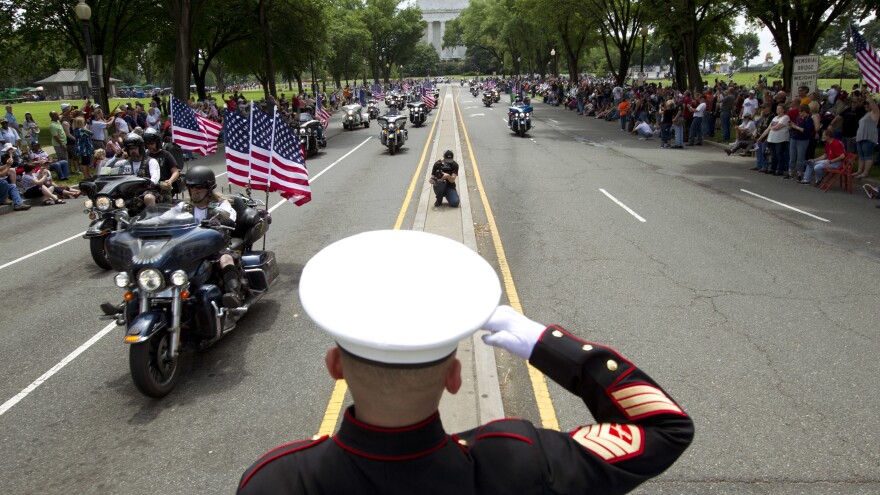Roll on, no more.
After a three-decade run, a veteran advocacy group will hold its last motorcycle demonstration ride — called "Rolling Thunder" — in the U.S. capital this Memorial Day weekend.
The nonprofit that organizes the rally, Rolling Thunder Inc., was founded in the late 1980s to bring public attention to prisoners of war and those missing in action and to hold the government to account for veterans who never made it home.
"We signed basically a blank check that said, 'I'll give you up to – and including – my life to defend our Constitution and defend the American freedoms,' " Doc Stewart, the group's New England regional liaison, told NPR's Amy Held. " 'But the return is, you're going to ensure that I come home afterwards.' "
Every year, hundreds of thousands of motorcyclists converge near the Pentagon outside Washington, D.C., then rumble through the city's downtown.
But next year's Memorial Day weekend will be a quiet one.
The main reason the organizers gave for calling it quits is financial; it costs them about $200,000 last year to hold the rally, WAMU's Mikaela Lefrak reports. A lot of that money went to the Pentagon for things like security, toilets and parking lot use, according to Rolling Thunder President Joe Bean.
Pentagon spokesperson Sue Gough told WAMU's Lefrak that the fees are appropriate: "Just keep in mind that effective preparation for an event the size and scale of the Rolling Thunder ride is a complicated and lengthy process, especially for security," Gough said. "The Pentagon has not wavered in its support of Rolling Thunder."
Regardless, the ride's organizers have decided their money can be better spent.
"The amount of money that we put on for the one demonstration ride, we could probably ... help a lot more veterans with it," Doc Stewart further told NPR.
Stewart said next year, the group plans to hold smaller rides at its chapters across the United States.
"We're not done – we do not have full accountability," he said.
Mike Wolff, a U.S. Army veteran and national board member for Rolling Thunder Inc., said he thinks local demonstrations might actually have more of an impact.
"None of the politicians are in town this weekend, so what better way to expand your impact than to ... bring these to your hometowns," Wolff said. Plus, he said, downsizing might give people who can't afford a trip to the capital a chance to participate.
But that's next year. For now, riders are getting ready to make their 32nd – and final – tour to Washington, D.C.
At a Harley-Davidson dealership in Fairfax, Va., about 5,000 bikers are expected to gather on Sunday morning. Then, they'll ride to the capital together with a police escort and, in many cases, American flags secured to their bikes.
"You can almost smell the patriotism, like in the air," the dealership's marketing director, Kevin Hardy, told WAMU's Mikaela Lefrak. "It's palpable, there's flags everywhere. And it's so many people."
In the '80s, the group's cause was centered on veterans of the Vietnam War.
So was its name. Founders Artie Muller and Ray Manzo named the group in reference to an airstrike campaign in North Vietnam that was called Rolling Thunder. The idea, according to the group's website, was that the "roar of their motorcycles" would sound like the bombs dropped during the campaign.
Muller, who served in the 4th U.S. Infantry Division in Vietnam, told WAMU's Lefrak that he was shocked by how he and other veterans of the war were treated by civilians.
"We weren't going to put up with anybody being treated the way we were," Muller said. "Spit at, called names ... people really blamed us for everything."
Wolff, who served in Iraq during the 2003 invasion, said that, in his experience, veterans of the Iraq War are treated better than Vietnam veterans were. But his return from service wasn't greeted with parades or celebrations, either.
"I came back to a cup of joe and a box of doughnuts," Wolff said. "And two people slapping me on the back."
The shared experience is one of the things Wolff says he'll really miss about the Rolling Thunder ride in Washington, D.C.
Wolff is trying to stay positive, but he knows he'll get emotional on the ride home on Monday, not just because it's the last Rolling Thunder, but also because it's a soul-stirring day for many veterans – Memorial Day.
Copyright 2021 NPR. To see more, visit https://www.npr.org.


